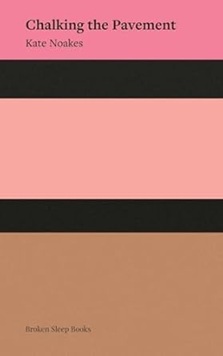Review of Chalking the Pavement by Kate Noakes, pub. Broken Sleep Books 2024

This us a Covid-themed pamphlet consisting of both poems and a long prose piece called “Field Notes 2020”. I think this is a piece of prose as opposed to a prose poem, partly because it is left-hand justified, and as far as I know, prose poems are justified both sides, but also because it does indeed read like notes in a journal, intended for shaping into poems later. Phrases like “Swallows fire themselves across the sky; bright crossbows; trigger-tight wings” leap out of the surrounding prose for all the world like the start of a poem, but prove not to be one.
This isn’t meant as a criticism, because after thinking about it, I have come to the conclusion that it is quite deliberate. “Field Notes 2020” comes very early in the pamphlet; it describes mainly the early months of the pandemic (when the poet was herself ill), and its stop-start, slightly unshaped, unfinished feel seems to reflect the uncertainty of the time: the way enterprises and intentions are frustrated and come, if not to nothing, at least to less than they otherwise might. There are many moments of beauty or happiness, like the “surprising kestrel hovering in rosy-blue”, but they are just that, fleeting moments. And many involve not the present, but memory or anticipation. In this context, “notes for future poems” seems an appropriate device.
If that is so, one would expect the succeeding poems to be considerably more shaped and polished, which indeed they are. The ones that work best for me are those that go beyond the actual pandemic, to find the universal in the particular, and the standout among these is “Ponies At The Airport”, with its echoes of Edwin Muir’s “The Horses”. Muir was describing the aftermath of an imaginary apocalyptic war, with humans not only deprived of modern technology but having come to mistrust it, and returning to their ancient partnership with horses. In Noakes’s poem, the ponies are real, grazing
between Heathrow’s hangers and cargo sheds,
on the edge of its runways
and by the acres of standing planes.
It isn’t likely, as the poet implicitly recognises, that this state of affairs will continue as it does in Muir’s poem, not when empty planes still fly and engines are kept in tune. But the hint of a different future is there: the horses
stamp and graze on through wet and fine.
Their grass may churn to mud, but they are there,
ready, whenever we want them.
There are some unfortunate typos that could usefully be corrected if these poems end up in a full collection – “an short” (The Sick Spring), “passed” for “past” in “I am brushed passed “ – (Field Notes), “before the engines arrives.” – (Source: A Car Fire), “summised” for “surmised” in ”On coming across John Snow’s grave in Brompton Cemetery during a pandemic”. That last is a pity, occurring as it does in another poem that successfully goes beyond the here and now to another epidemic, the cholera of the nineteenth century.
On the whole, this pamphlet does a good job of chronicling the period without sounding self-pitying or self-righteous. It was a period that many, including me, have no great wish to remember, and one result of that is my dilemma when reading “Countless Pyres, 2021”. This describes hastily-arranged mass funerals:
Every day, thousands of bodies
are stacked at the edge
of the funeral grounds, each
wrapped in white linen.
All day masked priests work at
fast ceremonies and rapid prayers
till they too are fit to drop.
When I first read this, I took it to be another instance of going beyond the particular, comparing the pandemic to the Black Death, because despite the date in the title, I couldn’t recall any such mass burials happening during Covid. I still do think this, but have to recognise that this might have happened, I just can’t recall for sure if it did or not, which says a lot about how many memories from that time I have blocked. Unlike Noakes, I didn’t keep “field notes” from the time; perhaps one day I’ll wish I had…



